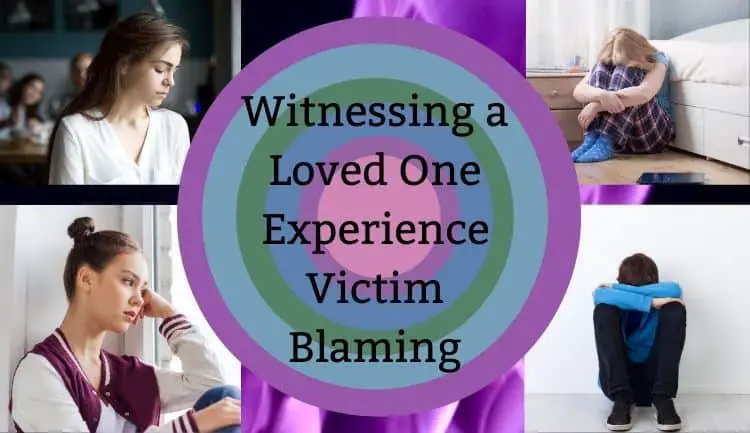Table of Contents
My personal experience
I’m not new to witnessing (and experiencing) victim blaming. People are often quick to question the victim to see whether they deserved what happened to them or not. That seems unfair. Right? The number of times I’ve seen persecutors being defended because the victim ‘must have done something to them’ is astounding.
You must be wondering now, ‘where is she going with this? What’s the point?’ Well, I’m here today to share my experience with witnessing one of my loved ones dealing with victim blaming.
I myself, have a constant need to fix things even if they can’t be fixed. So, you can imagine the helplessness I felt not being able to do anything but comfort them. An overwhelming feeling of desperation, trying to find ways to fix it but not knowing how.
It’s upsetting because I want to protect my loved ones from things that will upset them and just make their worries go away. But that’s not my job.
I had to realize then that what I was doing was probably the best thing I could do for them in that moment in time.
Victim blaming and how it affects the victim
If I felt that bad about being helpless, just imagine how horrible my loved one felt and other victims must feel? Countless people putting them down because of small imperfections that make them human.
Insignificant actions suddenly turn into antagonistic actions that ‘provoked’ the offender. People need to stop and realize how bad the other person must be hurting and stop blaming them for the persecutor’s actions.
Victim blaming can cause the victim to over-analyze every move they made and make them feel incredibly guilty for something that wasn’t their fault, whether it was sexual assault, or getting hit.
My heart goes out to any victims that have experienced victim blaming (and to those who haven’t). Victim blaming has become way too normalized in today’s society. It’s not the victim’s fault, that’s why they’re called ‘the victim’!
Granted, they might have hurt the offender’s feelings, but violence is not the answer. We’ve been told since we were young to keep our hands to ourselves (I’m still a young person but you see my point) and suddenly that teaching goes out the window because people become ‘too old’ to stick to basic teachings.
Is it your business?
Many people victim blame because it’s their friend who is the perpetrator and of course they couldn’t do anything wrong! Well, news flash! Clearly if they’re capable of doing something horrid to another person then maybe they aren’t really that good of a person to be around.
How could you defend someone who is willing to abuse another human being? What does that make you? Think about that for a moment…
Obviously, you would want to stay loyal to your friend but if they had abused someone then at least try to see it from the victim’s point of view, you could try and educate them! But if that doesn’t work and they refuse to see the error in their ways then maybe they aren’t worth keeping around.
If you support the abuser, then maybe try keeping your mouth shut. If it doesn’t concern you then what’s the point of putting someone else down, what are you achieving from it?
Empathy
My favorite way to empathize with someone is to imagine if I were in their shoes. Try it next time you are trying to comfort someone. It helps you find the right words to say.
Imagine if someone had done something despicable to you, let’s say you had been beaten up. Imagine the offender’s friends (and the offender) were defending them and making you feel guilty? You would feel so alone and ashamed, wouldn’t you?
You would feel like you HAD to prove yourself, prove that it wasn’t your fault, feeling like you were talking to a brick wall with spikes. When in reality, you shouldn’t have to prove anything to them, because it’s not any of their business.

Ways people harass victims
Some ways that people victim blame is on social media, they repeatedly message and harass the victim making them feel bad in their own home! A place where people should feel safe.
Harassing a victim over messages and repeatedly sending texts can be very overwhelming and scary. It can be worrying and make them miserable in a safe space. It can make them anxious to look at notifications which will eventually lead them to isolating themselves from friends.
Another way is passive aggressively posting or messaging them. This is a sneaky way to do it. They do this so they don’t look bad, and the victim doesn’t have any solid proof that they were aiming the post at them. This can be quite frustrating because they can’t say anything because there is no evidence to it being directed at the victim.
They also might just say it face to face at school or in a workplace, maybe even leaving notes in lockers or on desks. One of the best ways to respond to it is for the victim to ignore them and keep their head held high. This shows that they aren’t worth their time and will aggravate them and eventually they will stop.
Now I know that’s easier said than done, but it IS possible. They just have to fight their urges and do their best to maintain their composure. But they also need to let an authority figure know.
Friendly reminder
The main thing that victims should never forget is that they are not alone. There will always be someone, whether it’s family or friends, therapists or even a teacher. If they do have someone, they need to talk to them. It always helps to talk to someone, trust me.
What I hope for all you readers is that after you read this article you realize that what victims need is to feel supported, not guilty and ashamed! I want you all to stop and think the next time you try to blame someone for another person’s actions and try to think about how the victim feels. I hope you enjoyed this article.

